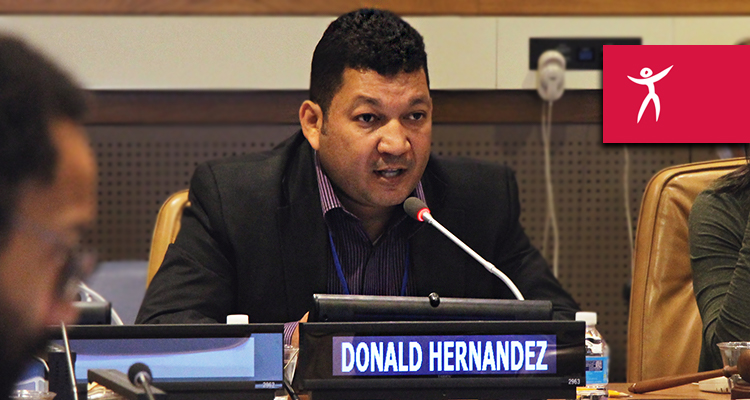
Human rights defender's story: Donald Hernandez Palma, environmental defender from Honduras
Donald Hernandez Palma spoke at the UN and underscored the severe risks faced by Honduran environmental defenders due to unchecked corporate power and a climate of impunity and corruption.
Donald Hernández travelled to the United Nations in New York in October to speak of his work and the risks Honduran environmental defenders face. Joining Special Rapporteur Michel Forst at a Third Committee side event on environmental defenders, Donald highlighted the general state of insecurity in Honduras which, coupled with high levels of impunity, ‘creates an environment where those who wish to threaten and attack environmental defenders have no disincentive to stop.’
Video | We speak with Honduran lawyer Donald Hernández about how corporate interests too often trump human rightshttps://t.co/wueRj9PwWR
— ISHR (@ISHRglobal) December 12, 2016
The struggle against powerful economic interests
Donald’s work at the Honduran Centre for the Promotion of Community Development (CEHPRODEC) centres on supporting communities confronting the impact of mining and hydroelectrical companies. The former include Canadian corporation Goldcorp Inc.
‘The most precious thing for our communities is having access to our rivers, our mountains and our land,’ Donald noted. ‘Mining companies have displaced our communities, destroyed our forests and contaminated our water with heavy metals. Children are being born with deformed limbs, and women are having miscarriages.’
According to Donald, such violations are enabled by a context in which the political system favors unregulated business interests. Corruption and impunity are also rampant. This, coupled with the fact that key political figures have invested in extractive companies in the country, enables businesses to operate without being held to account.
Consultations held by companies with communities affected by their work are largely meaningless, he intimated. ‘When companies conduct consultations with communities they essentially ask ‘how do you want me to operate?’ not ‘do you want me to operate here?’’ he said.
‘Companies come to the country, make millions in profits and then leave without being held accountable for the damages that they have caused. Who is responsible for the negative impact of their operations?’
The legal case of Pacific Rim against the State of El Salvador is an example of a corporation challenging a ban on mining on the basis of free trade agreements. Whilst the outcome in this case was positive from Donald’s point of view, concern about the power and ambition of corporations holds.
‘These transnational companies are more powerful than our own State,’ he said.
Grave risks faced by environmental defenders
Those challenging the activities of corporations can face huge risks. Honduras has the highest murder rate for environmental activists in the world. Criminalisation and stigmatisation of human rights defenders there is also rife. Donald says that teaching Indigenous communities about human rights can be portrayed as an activity aimed at stirring up communities. In demanding the respect of rights, defenders find themselves stigmatised as ‘terrorists’. Some media sources collude in this, suggesting that defenders travelling to distant communities are in fact involved in illicit activities. ‘Widows and widowers (then) have to deal with the pain of losing their partner and the shame of accusations of being traffickers’, noted Donald.
Whilst Honduras has a law to protect human rights defenders, journalists and justice operators, its effect is negligible.
The attacks on environmental defenders go on. Donald’s conclusion is stark. ‘Shareholders of companies need to become aware that their money is drenched in blood.’
With few options available to demand accountability at national level, regional and international human rights mechanisms become all important to defenders even though their recommendations are often ignored.
Speaking in New York, Donald called on the State and businesses operating in his country to respect human rights and the rights of human rights defenders to demand that they do so.
He also urged international organisations to keep on pressing for better protections for defenders. ‘As human rights defenders, the role of international human rights organisations is fundamental for us. This is what has helped keep many defenders alive.’
